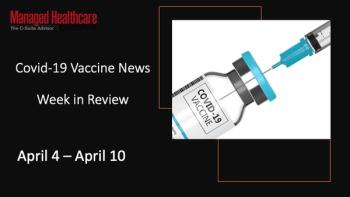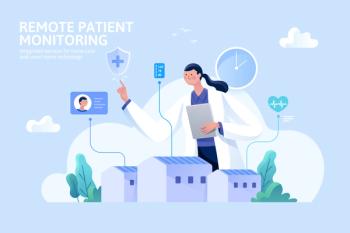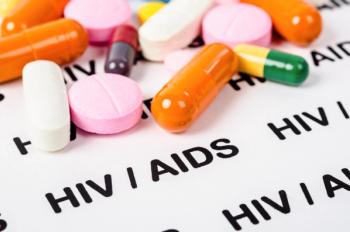
The triptans, long the workhorses of migraine treatment, have been joined by monoclonal antibodies and small-molecule drugs that block calcitonin gene-related peptide. What’s lacking is a precision approach to treatment based on biomarkers.

The triptans, long the workhorses of migraine treatment, have been joined by monoclonal antibodies and small-molecule drugs that block calcitonin gene-related peptide. What’s lacking is a precision approach to treatment based on biomarkers.

In this week’s episode of Tuning In to the C-Suite podcast Briana Contreras, associate editor of Managed Healthcare Executive, spoke with David Lareau, CEO of Medicomp Systems about four areas that must be addressed to improve the usability of health IT, address interoperability issues, and minimize clinician burden.

The new approval expands the drug's indication to include treatment in adult patients with unresectable locally advanced or metastatic triple-negative breast cancer.

Whether the cup of value-based care is half empty or half full may depend on your point of view. But the grail certainly isn’t full. Some of the leading lights at the Leonard Davis Institute (LDI) of Health Economics at the University of Pennsylvania have released recommendations to hasten the volume-to-value healthcare transformation.

Two common antidepressant and antifungal drugs were very effective at inhibiting SARS-CoV-2, the virus that causes COVID-19, according to a new study.

A couple of years ago, there was a lot of chatter about the Amazonifcation of healthcare. Well, that hasn’t happened. But the company is breaking into a sector of the economy that accounts for almost 18% of the American gross domestic product. Perhaps healthcare’s journey of Amazonifcation has started but is going step by step.

The Biden administration put a hold on the new and pending rule changes that the outgoing Trump administration made, so whether the Medicare Coverage of Innovative Technology pathway will ever take effect is uncertain. But many providers and payers — and presumably most device makers — are keeping a close watch on the fate of the pathway.

Recent report from Syft highlights hospital supply chain challenges at the point-of-use and key areas that need improvement.

To remain relevant in managed care, adoption of EHRs are crucial for outpatient surgery. Included are four reasons it's essential for surgery centers to adopt.

In this first of a two-part article series, Curtis Gattis, CEO and co-founder of LeadingReach, discusses how healthcare organizations participating in risk-based contracting or value-based financial and care delivery models are currently facing major challenges with integrating, managing and tracking care coordination and communication capabilities within provider networks.

More than a half million Americans have taken advantage of the Biden administration’s new health insurance keyed to the COVID-19 pandemic.


Real-world evidence (RWE) has the potential to be a transformative tool for healthcare providers to enhance the care they deliver to patients.

Significant attention has been paid to the recent surge in telehealth. This attention is valid. While usage of telehealth has declined from the initial months of the pandemic, FAIR Health data show that telehealth claim lines had increased more than 2,800% nationally from December 2019 to December 2020.

Nod from FDA comes as drugmakers are withdrawing indications for cancer drugs that were also approved an accelerated basis.

Most are in the riskier global risk track with 100% savings and losses.

In this final video of three-part video interview series, MHE spoke with founder and CEO of Gray Matter Analytics. In the discussion, Sheila addressed the topic of how healthcare organizations are missing out by not actively expanding their efforts to seek out and fast track talented individuals across many minority populations, especially in the c-suite.

As COVID-19 cases in nursing homes decline rapidly, the healthcare industry calls on congress to take on needed reform to address systemic issues facing industry.

In this second video of a two-part video series, MHE spoke with Dr. Ami Parekh, chief medical officer of Grand Rounds. Ami discussed the rise of the chief medical officer role, how businesses can benefit from it and what it means for the future of the C-suite. She also explained why it is so essential for businesses to provide advice and clinical guidance to help best keep operations running safely.

The novel nonstimulant medication from Supernus Pharmaceuticals can be sprinkled on food.

Covid-19 was the third leading cause of death in the United States last year, after heart disease and cancer, according to provisional data recently released by the US Centers for Disease Control and Prevention.

Today's episode of Tuning In to the C-Suite shares a conversation between Associate Editor of MHE, Briana Contreras, and CEO of Ob Hospitalist Group, Lenny Castiglione. The two talked about how and why hospitals and health systems are increasingly working with third party providers for obstetrics, as well as anesthesiology, nursing, and others to reduce costs and improve care for patients.

COVID-19 vaccine is safe — and more than a little advisable — for people with urothelial cancer, says a clinical pharmacist at the VA Pittsburgh Healthcare System.

No adverse events reported so far.

In this second of three-part video interview series, MHE spoke with founder and CEO of Gray Matter Analytics. In the discussion, Sheila addressed the topic of how healthcare organizations are missing out by not actively expanding their efforts to seek out and fast track talented individuals across many minority populations, especially in the c-suite.

Findings add to the understanding of the challenges that people living with HIV face now that it is a more manageable, long-term condition.

In this first video of a two-part video series, MHE spoke with Dr. Ami Parekh, chief medical officer of Grand Rounds. Ami discussed the rise of the chief medical officer role, how businesses can benefit from it and what it means for the future of the C-suite. She also explained why it is so essential for businesses to provide advice and clinical guidance to help best keep operations running safely.

UM School of Medicine discovery opens the door to testing more effective drugs for treating COVID-19 patients.

In this recent report, recommendations for ways to safeguard the U.S. from future pandemics are included.